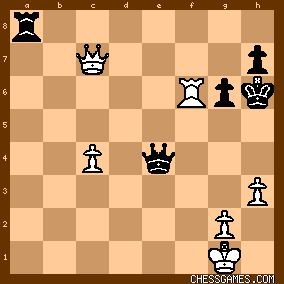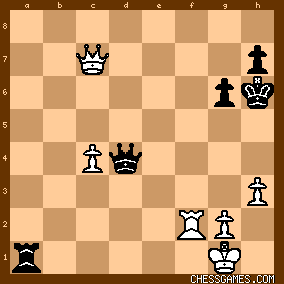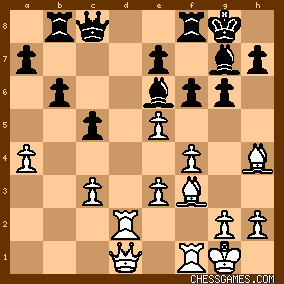|
< Earlier Kibitzing · PAGE 9 OF 9 ·
Later Kibitzing> |
| Jun-03-08 | | notyetagm: http://www.chesscafe.com/mueller/mu...:
<E86.01 M.Taimanov - R.J.Fischer
Candidates qf3, Vancouver 1971

click for larger viewWhat did Taimanov miss, when he took on f6 with his rook?> 46 ...♕e4-d4+ <queen fork> 47 ♖f6-f2 <f2-rook is both pinned -and- loose> ♖a8-a1+ <REMOVES THE GUARD> by <DRIVING OFF> the White g1-king from the <LOOSE> White f2-rook. Position after 46 ... ♕e4-d4+ 47 ♖f6-f2 ♖a8-a1+ 

click for larger viewTaimanov (White) seemed to overlook the rather trivial tactical point that not only is his White f2-rook <PINNED (MISPLACED PIECES)> but it is also <LOOSE (LACK OF PROTECTION)> and <LPDO - LOOSE PIECES DROP OFF>. White can meet Black's attempts to <REINFORCE THE PIN> with 47 ... ♖a8-a2? 48 ♕c7-f4+ or 47 ... ♖a8-f8? 48 ♕c7-g3 but White cannot meet the simple <REMOVAL OF THE GUARD> 47 ... ♖a8-a1+, exploiting the <LOOSENESS> of the White f2-rook and not its <PINNED> nature. |
|
| Dec-03-09 | | Hesam7: << 21. ... Rb8>
click for larger viewTaimanov said it was not until "many years later" that he realized this was the critical stage of the game. With 22. Rff2! he would have had strong winning chances.> -- Soviet Chess 1917-1991 by Andrew Soltis |
|
| Mar-22-10 | | birthtimes: One wonders why Taimanov chose the 4. Bg5 line over the 4. Nf3 line, since he had had better success with the latter. Also, it looks like Taimanov had never gone against the 6...dxc4 line, as he had only previously played against the 6...c5 line once in 1969... |
|
| May-18-10 | | Damianx: But look at it this way how brilliant and special to do the ordinary the expected and yet crush every other GM. Kasperov said Fisher completely changed opening theory was light years ahead of the rest without Fisher modern chess would have evolved at a lot slower rate |
|
| Sep-17-10 | | whiteshark: <birthtimes: One wonders why Taimanov chose the 4. Bg5 line> coz that's the <Taimanov Variation<>>, his pet line. |
|
| Aug-17-11 | | DrMAL: Fischer went +10 -4 =6 with Grunfeld as black, where one loss was in blitz. I covered his two most important losses with it before, this was an unmemorable but important win. 8.Rb1 is less common than 8.Nf3 but also strong. GM Akobian employed it twice in 2007 (1 win, 1 loss). The same was used by Mecking vs Fischer, 1970. Here, 9.Be2 was played instead of (more common) 9.Nf3 and Fischer's 9...Bh6 (instead of 9...Bg7) was new (he played 11...Bg7 anyway). 12.f4 shunned taking a pawn (via 12.Nxc4) for a sharper "stonewall" but it created K-side looseness as well. After 15.c5 black's Q-side pawn structure is better, typical in Grunfeld. Along these lines, 16.Ne5 is positionally questionable. After a long battle with only a few slight inaccuracies by both sides, the game is drawn until white got greedy with 46.Rxf6?? missing simple 46...Qxd4+ maybe Taimanov was in time trouble? |
|
Apr-06-12
 | | Peligroso Patzer: <keypusher: ***
Here's what Taimanov said happened after 45. […] Kh6: <For a few minutes I was puzzled: "Why has Fischer sacrificed a pawn?" And then I found an "explanation": Fischer dislikes passive defense and for this reason he preferred 44...Qe4 to 44...Qe5 [which the Soviet team expected]. Now after 46. Rxf6 he will replay 46...Ra2, I will have to exchange the queens -- 47. Qf4+ Qxf4 48. Rxf4, and his rook will take up an active post at c2, assuring Fischer of a draw. "Well," I decided, at least I'll have the moral satisfaction of being a pawn up." *** >> I don’t know whether the thought was in Taimanov’s mind, or whether the fact mattered to Fischer, but as of the start of this game Fischer’s winning streak (which eventually extended to 20 games) stood at 11 games. A draw would have broken that streak. Fischer probably was predominantly concerned with closing out the match victoriously, but given the possibility that he cared about extending his streak, the Soviet GM should have considered the possibility that there was poison in the move [<44. … Qe4>] and taken time enough to search more carefully for traps. |
|
Dec-31-12
 | | FSR: Amazing. Of course 46.Qf4+ (among other moves) draws with great ease, so no 6-0 match win and no 20-game winning streak for Fischer. Of course Taimanov was desperately trying to find a way to <win> a game, not draw one. |
|
| May-23-13 | | RookFile: 46. Kh1 is probably ok too. White could lose the c pawn outright and still hold a draw in a rook and pawn ending - although in that case you sign yourself up for more torture by Bobby Fischer. |
|
| May-24-13 | | andrewjsacks: <FSR> Right. This loss is colored by desperation and despair. Had it been Game One of the match, I wager it would have been drawn. |
|
| May-21-15 | | RookFile: With David Letterman retiring, I have to say that 46. Rxf6 has to be one of the top 10 worst moves ever played in top professional chess. |
|
| Oct-06-15 | | gabriel25: Bobby because personally he was a very nice guy was very unjustly dealt by the American media and shamefully by the American government also by the criminally sycophantic attitude of the Japanese government to the American government imprisioning him.
It seems he should had some grievances.
He was the only good action in the Cold War for the American side, and no recognition of it was ever aknowledged by either media or government.
If your opinion of his chess depends on your personal feeling your chess oppinion is of very little value. |
|
| Oct-11-16 | | Howard: Regarding Petrosian's comment about the Boys' Life short story, that was in late 1973/early 1974. Still remember it fairly well. Petrosian's recollection of the plotline isn't entirely accurate, but that's no big deal. But, he was right about one thing---the short story was rather dumb. Whoever wrote it obviously didn't know much about professional chess. |
|
| Jun-30-19 | | N.O.F. NAJDORF: The finish reminds me of:
Reshevsky vs Fischer, 1970 |
|
Oct-24-23
 | | keithbc: in Fischer v the Russians, it states (when Fischer made the winning move) 'with the words ''I'm sorry'': Really?? Payers do not talk when playing so why was this written - Did Fischer really utter ' I'm sorry'? |
|
| Oct-24-23 | | Muttley101: <keithbc: in Fischer v the Russians, it states (when Fischer made the winning move) 'with the words ''I'm sorry'': Really?? Payers do not talk when playing so why was this written - Did Fischer really utter ' I'm sorry'?> Yes, he did. He did so because Taimanov hung a rook in a position where he had been better, and Fischer got an undeserved half point (or whole point if Taimanov had been able to win with the passed c-pawn- debateable), and not only felt bad at winning like this, but also understood how upsetting this would be for Taimanov and what he would face when he went back to Russia having been beaten hollow. This blunder gave Fischer his fifth win a row in the match, and he won the match 6-0. Fischer had considerable rectitude, something people seem to forget when evaluating his heritage. |
|
Nov-06-23
 | | keithbc: Muttley101
I get the reason why Fischer had some sympathy here but I question her (or any professional player) would talk to his opponent when making a move - I remain unsure why the books state ' with the words ''I'm sorry'! |
|
Nov-06-23
 | | perfidious: <Muttley101....Fischer had considerable rectitude, something people seem to forget when evaluating his heritage.> For all the other hijinks, Fischer's behaviour at the board and towards his opponents was indeed exemplary; one example of his grace was seen in the celebrated loss to Unzicker at Buenos Aires 1960. |
|
| Nov-08-23 | | Granny O Doul: The "Flasher fever" story is readable at: https://books.google.com/books?id=m... . To say even "good" or "bad", IMO, is a bit of a spoiler, so I leave it to you to decide. The author, Jack Ritchie, is wikiable. He had many short stories published which the article credits in part to his agent and his wisdom in submitting stories to fledgling publicstions desperate for material. |
|
| Nov-08-23 | | Muttley101: <keithbc: Muttley101
I get the reason why Fischer had some sympathy here but I question her (or any professional player) would talk to his opponent when making a move - I remain unsure why the books state ' with the words ''I'm sorry'!>At the risk of stating the obvious, the books state it because that's what Fischer said to Taimanov, and Fischer said it for the reasons given earlier. It's not hard to grasp that, plus there were people who witnessed it, and that's pretty much the same thing I said earlier. Saying "I don't believe someone would do that so it can't be true" is an example of "confirmation bias" and how people avoid their opinions being challenged by actual evidence. If you haven't, play over the games and see how much closer the match was, plus Fischer's superlative play in some of the games. Good luck. |
|
Nov-09-23
 | | Sally Simpson: I do not have the book but in the book; 'I was a Victim of Bobby Fischer' by Mark Taimanov he gives as the heading to Game Five as 'I'm Sorry.' see a sample PDF of the book which does give the headings to each game. https://www.newinchess.com/media/wy... |
|
Dec-04-23
 | | keithbc: Fischer who said ' I like to crush their ego' and wants to 'seem them squirm' says 'I'm sorry'? Sorry but I do not buy it. |
|
Dec-04-23
 | | tamar: Since 47…Ra1+ is the last move, Taimanov had enough time to see Fischer’s hand reach for the rook, and to grasp the horror of what he had done. In that case, “I’m sorry” would come at the same time as a grimace or wave of the hand indicating resignation, and would not be a violation of chess rules. It jibes with Fischer’s statements after the match “The 6-0 was too high. The struggle was much more difficult than the score suggests…” |
|
Feb-11-24
 | | gezafan: Was Taimanov's blunder the first move he made after the adjournment? |
|
Feb-11-24
 | | beatgiant: <gezafan> No. The sealed move was 42. Bxc5, as pointed out in earlier kibitzing. |
|
 |
 |
|
< Earlier Kibitzing · PAGE 9 OF 9 ·
Later Kibitzing> |





